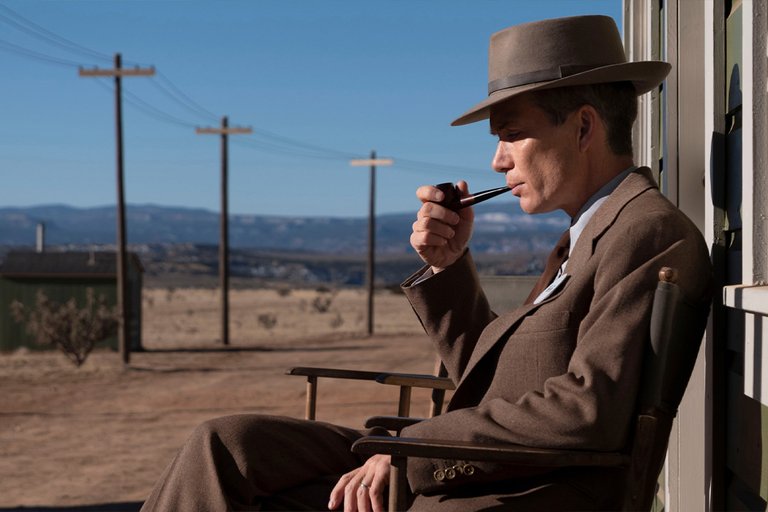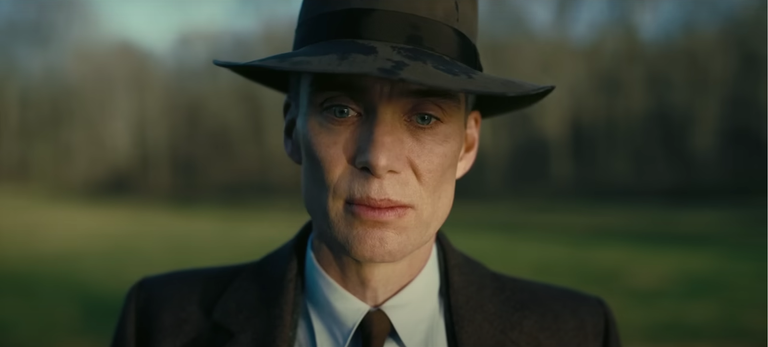Today, I'm diving into Christopher Nolan's latest offering, "Oppenheimer," a historical biopic centered around the brilliant scientist J. Robert Oppenheimer and his involvement in the Manhattan Project. As someone who penned a bachelor's degree essay on atomic bomb in film history, I had high expectations for this flick. But sadly, "Oppenheimer" left me feeling underwhelmed.

Let's start with the positives, though. The political intrigue surrounding McCarthysm and the government's manipulation of a formidable mind like Oppenheimer's provides a captivating backdrop. Cillian Murphy's portrayal of the titular character is a standout performance, backed by a stellar ensemble cast featuring Emily Blunt, Florence Pugh, and Robert Downey Jr., who all shine in their respective roles. Visually, the Trinity atomic test scene is an impressive spectacle, but I couldn't help but feel that archival footage of real atomic tests could have been equally impactful. Here is the real Trinity test archival footage, which isn't as impressive:
However, the film's downsides overshadow its strengths. First and foremost, "Oppenheimer" is just too long. It becomes a challenge to stay engaged throughout the film's unnecessarily drawn-out runtime. The breakneck pace of the story feels rushed, introducing an overwhelming number of characters without adequate development or context. As a result, it's hard to form a deep connection with any of them.
Dialogue-driven progression dominates the film, leaving me craving more visual storytelling and emotional depth. The chaotic script hampers coherence, making it difficult to invest fully in the characters, including Oppenheimer himself. While the political and scientific aspects are interesting, the film sorely lacks exploration of Oppenheimer's personal life, leaving an emotional void.

As someone knowledgeable in the topic, I yearned for a more comprehensive portrayal of the Manhattan Project. "Oppenheimer" impressively depicts the Trinity atomic test, but beyond that, there's little insight into the construction and development of the bomb, which feels like a missed opportunity.
Finally, the sound mixing was a letdown, with loud music often drowning out crucial dialogue, leaving me straining to catch important conversations. Luckily I had subtitles in my first language - otherwise it would be really hard to watch the movie.
Summary: "Oppenheimer" had potential to be an enthralling historical biopic, but it falls short of the mark. While the political intrigue and Cillian Murphy's performance stand out, the film's excessive length, rushed pacing, lack of character depth, and missed opportunities in storytelling make it a disappointment. As someone well-versed in the subject matter, I hoped for a more profound exploration of Oppenheimer's life and the historical events surrounding the atomic bomb.
My rating: 5 out of 10 points.
Thanks a lot for the review. Now I know I will skip it :)
@tipu curate
Upvoted 👌 (Mana: 61/71) Liquid rewards.
This film fails to mention the many US victims of Oppenheimer's nuclear experiments. In the area selected to carry out the first test of an atomic bomb in New Mexico indigenous farmers were given 24 hours to leave their land and their livestock was slaughtered by the US army. Then some of the destitute farmers were given work at the Los Alamos nuclear labs and were deliberately exposed to toxic nuclear waste while white workers were given protective suits. Why didn't this film cover this issue? In my mind Oppenheimer was a war criminal who should be forever damned as the man who helped kill hundreds of thousands of innocent people not celebrated.
Nolan mentioned the indigenous population of New Mexico a few times, but without details. Obviously the US, Soviet Union and to the lesser extent the UK and France did a lot of terrible things to native people of various regions in the world, just to test the A bombs... Here's how they were treating native people from the Bikini Islands:
However, I don't think that Oppenheimer was the war criminal himself. When it comes to the unfair treatment of New Mexico residents, it's the US Army to blame. Yes, the atomic bomb has killed about 220-250 000 people, however it also prevented a lot of big wars, in which the loss of life would be far, far greater in numbers.
Had there been no bomb, millions of people would have died during the invasion of Japan. And the Soviets, more likely then not, would have launched a ground invasion of Europe in late 40's or early 50's...
Thanks for your comment. You make alot of unfounded/inaccurate comments and I would suggest you read up on your history.
The atomic bomb did not prevent the Korean war in the early 1950s or the war in Vietnam which started in the late 1940s (when its was a French colony) and then continued into the 1960s when the US invaded South Vietnam.
You repeat the myth that the bomb needed to be dropped to save US soldiers lives who would have died during an invasion of Japan. Absolutely not true. Japan was on the verge of surrender in 1945 its population was going hungry as was its army. When the Soviet Union attacked Japan's army in Manchuria during the early summer of 1945 it collapsed like a pack of cards.
A US invasion would have met similar success at a low cost in casualties.
The second myth you repeat is that the USSR would have invaded central Europe if the US did not have a nuclear bomb. Absolutely untrue once again. The Nazi invasion of 1941 killed 27 million Russians and left tens of thousands of villages, towns and cities destroyed. The USSR took 20 years to recover from the destruction of the German genocidal invasion. Moscow had no interest in invading central Europe its hands were full of rebuilding the USSR. NATO was formed in 1949 as an offensive alliance and the Warsaw Pact was created later in response to this US military alliance.
The Oppenheimer film is Hollywood's attempt to whitewash history.